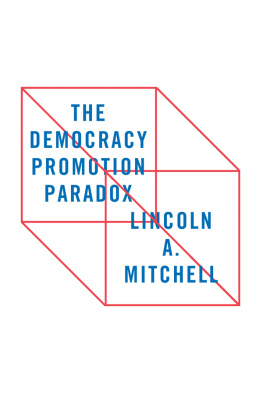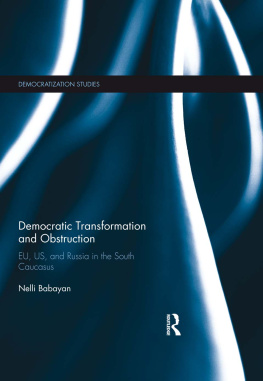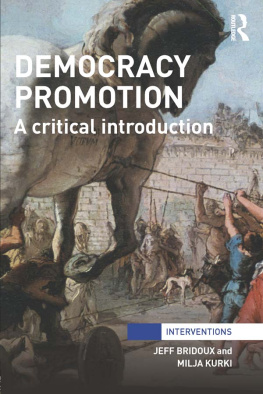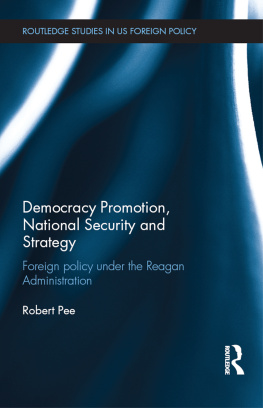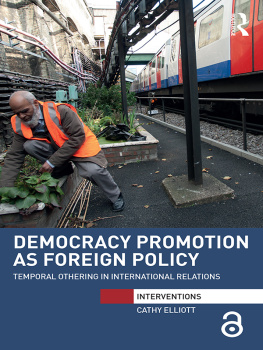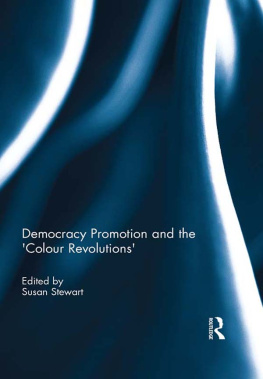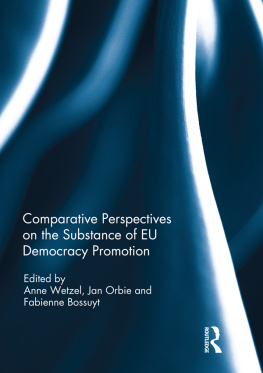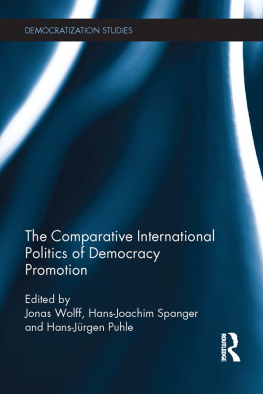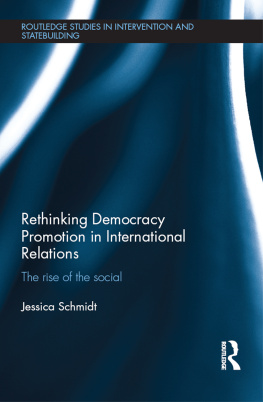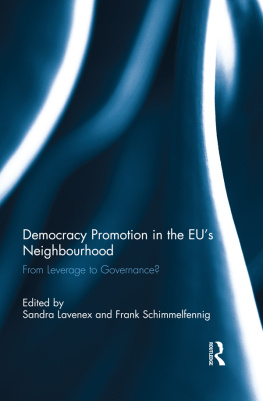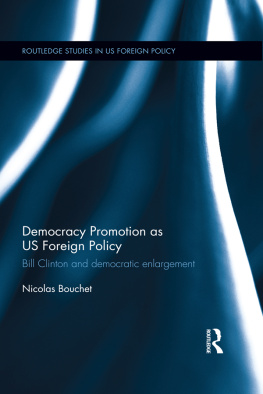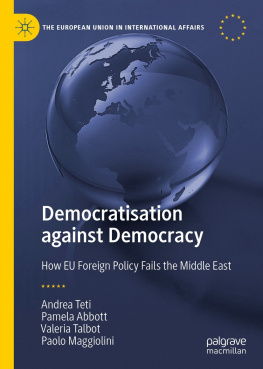Copyright 2016
THE BROOKINGS INSTITUTION
1775 Massachusetts Avenue, N.W., Washington, D.C. 20036
www.brookings.edu
All rights reserved. No part of this publication may be reproduced or transmitted in any form or by any means without permission in writing from the Brookings Institution Press.
The Brookings Institution is a private nonprofit organization devoted to research, education, and publication on important issues of domestic and foreign policy. Its principal purpose is to bring the highest quality independent research and analysis to bear on current and emerging policy problems. Interpretations or conclusions in Brookings publications should be understood to be solely those of the authors.
Library of Congress Cataloging-in-Publication data
Names: Mitchell, Lincoln A., author.
Title: The democracy promotion paradox / Lincoln A. Mitchell.
Description: Washington, D.C. : Brookings Institution Press, 2016. | Includes bibliographical references and index.
Identifiers: LCCN 2015046469 (print) | LCCN 2016005723 (ebook) | ISBN 9780815727026 (paperback) | ISBN 9780815727033 (epub) | ISBN 9780815727040 (pdf)
Subjects: LCSH: DemocratizationGovernment policyUnited States. | United StatesForeign relations. | BISAC: POLITICAL SCIENCE / Political Ideologies / Democracy. | POLITICAL SCIENCE / International Relations / Diplomacy. | POLITICAL SCIENCE / Political Freedom & Security / General.
Classification: LCC JZ1480.A55 M58 2016 (print) | LCC JZ1480.A55 (ebook) | DDC 327.1/1dc23
LC record available at http://lccn.loc.gov/2015046469
9 8 7 6 5 4 3 2 1
Typeset in Janson
Composition by Westchester Publishing Services
PREFACE
I STARTED WORKING IN DEMOCRACY PROMOTION in 2000. At that time, when I would leave my New York home to work in the Balkans, the former Soviet Union, or elsewhere, friends and acquaintances, on hearing where I was going and what I was doing, would express surprise that the United States was involved in that kind of work and would encourage me. Those were the last days of the Clinton administration and what still felt like the 1990s. Five years later other friends and acquaintances, when learning what I did for a living or that I was preparing to go to Kinshasa, Bishkek, or Baku to do democracy promotion work, would roll their eyes and sarcastically mutter Just like in Iraq. By 2009 or so, the response I encountered was generally to the effect of Why dont we use some of that money to build schools or something here? (in the United States). These changing reactions capture the evolution of American opinion about democracy promotion as well as the changing environment in which that work has been pursued in the last quarter century. By 2012, I rarely bothered to explain to people why I was going away, but just told them it was for work.
In The Democracy Promotion Paradox , I draw on over a decade of experience implementing, evaluating, and advising on democracy promotion work. During most of those years, I was also a scholar studying and writing about democracy promotion. Working as a scholar and practitioner has brought a good synergy to both areas of work and, I hope, to this book as well. It has also created challenges for me in both the democracy promotion and scholarly communities. The former has often considered me too critical of democracy work, while the latter has occasionally seen me as too sympathetic to the work of democracy promotion. That tension is also reflected in this work.
This book is intended as an analysis of democracy promotion, emphasizing the paradoxes that can make democracy work simultaneously puzzling, frustrating, exciting, rewarding, and, occasionally, even effective. This approach leads to analysis that focuses on the shortcomings and problems of democracy promotion, while often appearing to overlook the positive aspects and successes of the work. Had I written a book called The Democracy Promotion Synergy, it probably would have had a different tone, but that approach would also have missed some of the most important points of the analysis. These paradoxes are real and important. Ignoring them or seeking to push them away through platitudes and assumptions will only create greater problems for democracy promotion and indeed for U.S. foreign policy more broadly.
Nonetheless, I struggled with the tone throughout the work. I sought a balance, identifying and exploring the paradoxes while avoiding simply reciting lists of the problems of political development or democracy work. My goal was to strike a tone of critical analysis, not hostility. A paradox of my own is that while I have written critically of U.S. democracy promotion, I have tremendous personal and professional respect for many working in the field and the work that has been done, and believe in the overall aim of trying to make it possible for more people to live in democratic and free states. I am a critic of some aspects of democracy promotion, but for many years have also been a member in relatively good standing of the democracy promotion community. This is my own democracy promotion paradox that also lies at the heart of this book.
A tendency to focus on the difficulties of democracy promotion while quickly brushing over the successes of democracy work is difficult to avoid. There are, however, many successes. The transformation of postwar Germany and Japan into democracies, the spread of elections and democracy as the norm (albeit one still too often honored in the breach) to almost every corner of the world, and consolidation of democracy in much of postcommunist Eastern Europe and in parts of Asia and South America are all among the major global developments in which U.S. supported democracy promotion has played a role. The work of U.S. democracy promotion should not be overlooked, however, in other less visible or dramatic areas. All over the world, local civil society organizations that would not exist absent American support are fighting for free media, against corruption, and for womens rights; parliaments and other legislatures are more responsive because of U.S.-backed programs; and authoritarian leaders are a little more wary of stealing the next election because they know local organizations, trained and supported with help from the United States, will be watching. All this has been achieved despite the paradoxes that surround democracy promotion.
Democracy promotion is associated with the United States more than with any other countryespecially among Americansbut many other countries, mainly in Europe, also seek to promote democracy abroad. This work is done sometimes in collaboration with U.S. efforts and sometimes independently. Tsveta Petrova and Laurynas Jonavicius are among those who have written about democracy promotion work by newer democracies, specifically postcommunist countries in Eastern Europe.
This book, however, focuses on American democracy promotion efforts and the relationship between that and broader American foreign policy. A larger, more global examination of democracy promotion would raise, and perhaps answer, different and important questions, but Polands efforts to promote democracy or the question of whether or not India is meaningfully contributing to global democracy have little bearing on the paradoxes and challenges confronting U.S. democracy promotion.
REGIME TYPES AND TERMS
The terms democracy promotion and democracy assistance are used interchangeably throughout this book. The term democracy work is also used occasionally, but usually refers to a broader definition of democracy promotion.

